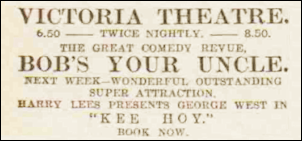Bob’s your uncle
Q From Florence C Goold: What is the origin and actual meaning of bob’s your uncle?
A This is a catchphrase which seemed to arise out of nowhere and yet has had a long period of fashion and is still going strong. It’s known mainly in Britain and Commonwealth countries, and is really a kind of interjection. It’s used to show how simple it is to do something: “You put the plug in here, press that switch, and Bob’s your uncle!”
Sow it into soil in one of those plastic containers rescued from the recycling bin, a sunny windowsill, eight to 10 days, and Bob’s your uncle.
The Independent on Sunday, 26 Apr. 2015.
The most often-heard and attractive theory — albeit suspiciously neat — is that it derives from a prolonged act of political nepotism. The Victorian prime minister, Lord Salisbury (personal name Robert) appointed his rather less than popular nephew Arthur Balfour to a succession of posts. The most controversial, in 1887, was chief secretary of Ireland, a post for which Balfour — despite his intellectual gifts — was considered unsuitable. The Dictionary of National Biography says: “The country saw with something like stupefaction the appointment of the young dilettante to what was at the moment perhaps the most important, certainly the most anxious office in the administration”. As the story goes, the consensus among the irreverent in Britain was that to have Bob as your uncle was a guarantee of success, hence the expression. Since the very word nepotism derives from the Italian word for nephew (from the practice of Italian popes giving preferment to “nephews”, a euphemism for their bastard sons), the association here seems more than apt.
The big problem with the story is dating. As the American researcher Stephen Goranson has discovered, the earliest known usage is in the title of a revue at the Victoria Theatre, Dundee, in June 1924, described in one advertisement as featuring “Good singing, mirth, dancing, and beauty chorus”.

The first-ever apperance of the expression, in an advertisement in the Dundee Evening Telegraph on 19 June 1924.
We can reasonably assume that the title wasn’t invented for the show but was a catchpenny reference to a phrase that already had fairly wide currency. How far further back it goes is impossible to say.
If Balfour had been the stimulus, the expression would have most probably appeared during his early political career four decades earlier — for example in a satirical magazine such as Punch — rather than in later life (he became prime minister in 1902). This long gap makes it unlikely that he was the source.
A show with the same title appears in the record in April 1929, in an ad in the North Devon Journal by the Regent Theatre, Barnstaple. This is described as “a great musical comedy” but a brief notice of it in the same journal during its run describes it as a revuesical (a blend of revue and musical which had some popularity at the time and has recently been resurrected). This doesn't seem to be the same show as the Dundee one. However, it does feature a character named Bob, who is presumably the one of the title.
A nonsensical riddle appears in the sporting columns of the Buckingham Advertiser and Free Press of 12 March 1932: “I don’t know how it works out. Something after the style of thing as ‘If Bob’s your Uncle, how old would your Aunt’s mother be?’” How this fits into the story of the idiom’s development is unknown.
Another puzzling newspaper appearance was three years later and half a world away:
From the Australian Publishing Company (Australia House, Wynyard Square, Sydney) we have received a pack of cards used in the new card game ‘Bob’s Your Uncle.’ The new game has been produced by John Waddington, Ltd., and is said to have become very popular in England. The play bears some resemblance to rummy, but in place of the ordinary cards a pack has been designed based upon the best known of the old nursery rhymes.
West Australian (Perth, Australia), 10 Sep. 1935.
Does anybody know a nursery rhyme that features an uncle named Bob? I can’t find one. Perhaps the game’s title was intended to impress on players how easy it was to learn.
Apart from these hints, everybody who has looked into the history of the expression has ended up baffled. Bob has had many slang associations down the years, often linked to crime, gambling or deceit. The slang phrase all is bob, meaning that everything is pleasant, satisfactory or safe, dates from the seventeenth century. It’s in The New Dictionary of the Canting Crew of 1699 as it’s all bob and other entries in the same work similarly imply that bob referred to something good. From the eighteenth century on it was a common generic name for somebody you didn’t know. One or other of these could conceivably have contributed to the genesis of Bob’s your uncle.
